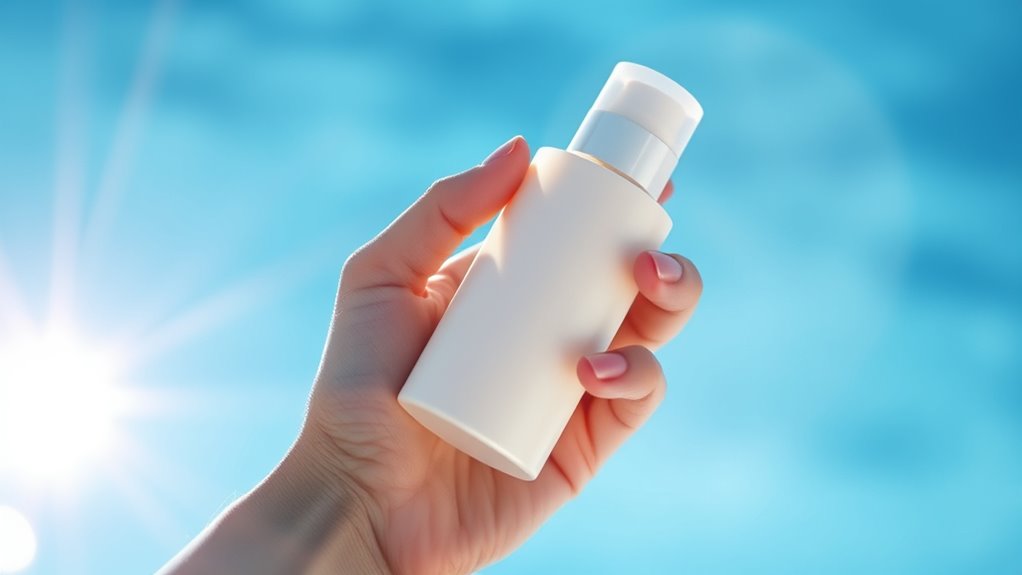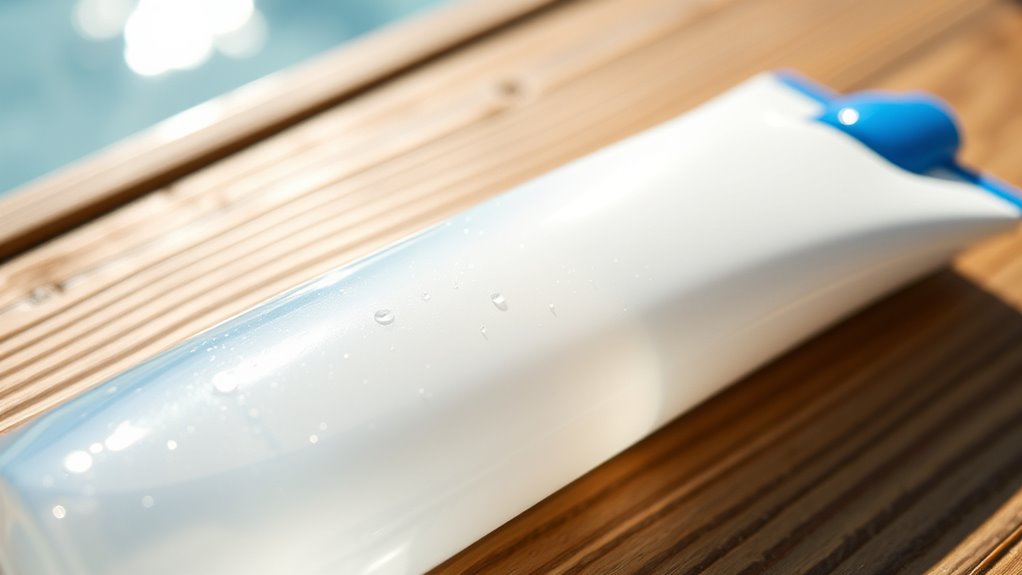Blue light from screens can harm your skin like UV rays, causing premature aging, dark spots, and inflammation. Traditional sunscreens mainly protect against UV rays and don’t fully block blue light. To shield your skin, look for sunscreens with antioxidants like vitamin C or ingredients like iron oxide that specifically block blue light wavelengths. Wearing blue light glasses and limiting screen time also helps. Keep going to discover more effective ways to defend your skin from blue light damage.
Key Takeaways
- Traditional sunscreens mainly block UV rays; look for products with ingredients like iron oxide for blue light protection.
- Blue light can penetrate deep into the skin, potentially causing premature aging, hyperpigmentation, and inflammation.
- Use broad-spectrum sunscreens combined with antioxidants like vitamin C or niacinamide for comprehensive skin defense.
- Incorporate physical barriers such as blue light glasses and screen filters during extended screen exposure.
- Regularly update skincare routines and take breaks from screens to minimize blue light-related skin damage.

Many people overlook blue light when choosing their skincare, but emerging research shows it can impact your skin just like UV rays. You might not realize it, but the screens you spend hours in front of—phones, computers, tablets—emit blue light that penetrates deep into your skin. Unlike UV rays, which are well-known for causing sunburns and skin damage, blue light’s effects are only beginning to be understood. Still, studies suggest it can contribute to premature aging, hyperpigmentation, and even skin inflammation over time. This means that protecting your skin from blue light is becoming just as important as applying sunscreen when you’re outdoors.
Blue light can harm your skin like UV rays—protect it daily with antioxidants and screen habits.
While traditional sunscreens are designed primarily to block UV rays, many skincare experts are now emphasizing the need for protection against blue light. You might wonder if your usual SPF offers any defense, and the answer is that some broad-spectrum sunscreens do provide partial protection. However, not all sunscreens are formulated to shield against blue light specifically. Look for products containing antioxidants such as vitamin C or niacinamide, which can neutralize free radicals generated by blue light exposure. Some sunscreens now include ingredients like iron oxide, which has shown promise in blocking blue light wavelengths. Incorporating these products into your daily routine can help create a barrier that reduces blue light’s penetration into your skin.
It’s also wise to think about your daily habits. If you spend hours in front of screens, taking breaks and adjusting your environment can make a difference. Using screen filters or blue light glasses can help minimize exposure during work or leisure time. Additionally, applying skincare products with antioxidants before bed can support your skin’s resilience against environmental stressors, including blue light. Remember, protecting your skin is a layered approach—combining physical barriers, smart habits, and targeted skincare gives you the best chance to mitigate blue light’s effects.
Understanding the importance of blue light protection doesn’t mean you need to overhaul your entire skincare regimen overnight. But being aware of its potential impact empowers you to make smarter choices. As research evolves, expect more specialized products designed specifically to combat blue light damage. For now, focus on using broad-spectrum sunscreens with added antioxidants, limiting screen time when possible, and incorporating protective skincare ingredients. By doing so, you’re proactively safeguarding your skin’s health and youthfulness, even in a digital age where blue light exposure is unavoidable.
Additionally, recent studies highlight that high-energy visible light can also contribute to skin aging, emphasizing the importance of comprehensive protection.
Frequently Asked Questions
Can Blue Light Exposure Cause Skin Cancer?
Blue light exposure isn’t directly linked to skin cancer, but it can cause skin damage like premature aging and pigmentation. You might not need to worry about cancer risks from blue light as much as from UV rays. Still, protecting your skin with sunscreen and avoiding excessive screen time helps maintain healthier skin. Stay mindful of your overall skin care routine to minimize potential damage from various light sources.
How Does Blue Light Affect Skin Aging?
Blue light accelerates skin aging by penetrating deep into your skin layers, generating free radicals that damage collagen and elastin. This process leads to wrinkles, fine lines, and loss of firmness over time. If you’re often exposed to screens or outdoor sunlight, you could notice these signs sooner. To protect your skin, consider using skincare with antioxidants and broad-spectrum sunscreens that block blue light effectively.
Are There Specific Ingredients to Look for in Blue Light Sunscreens?
Think of a shield protecting your skin from the invisible assault of blue light. Look for ingredients like iron oxides, zinc oxide, and titanium dioxide in blue light sunscreens. These act like armor, reflecting or absorbing blue light. You also want antioxidants such as vitamins C and E, which neutralize free radicals. Together, these ingredients form a barrier, helping your skin stay youthful and resilient amidst digital exposure.
Is Blue Light Protection Necessary Indoors?
Yes, blue light protection can be beneficial indoors, especially if you spend many hours in front of screens. Blue light penetrates the skin and may contribute to aging and eye strain. Wearing sunscreen with blue light protection helps create a barrier against this light, reducing potential damage. If you’re often near devices, incorporating a blue light shield or using skincare products with antioxidants can also support your skin’s health indoors.
How Often Should I Reapply Blue Light Sunscreen?
You should reapply blue light sunscreen every two hours when you’re exposed to screens or indoor lighting. While some believe reapplication isn’t necessary, evidence suggests blue light exposure can accumulate and affect your skin over time. To maximize protection, reapply regularly, especially during long indoor days. Keep a small bottle handy and set reminders so you don’t forget to refresh your shield against blue light’s potential effects.
Conclusion
Now that you know the importance of protecting your skin from blue light, it’s clear that using sunscreen isn’t just for sunny days. Did you know that blue light exposure can increase skin aging by up to 20%? So, next time you’re on your device or outdoors, remember to apply a broad-spectrum sunscreen with blue light protection. Staying mindful of your skin’s needs helps keep it healthy, youthful, and glowing for years to come.









